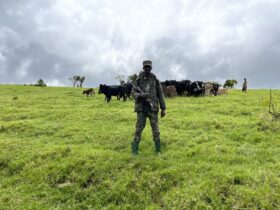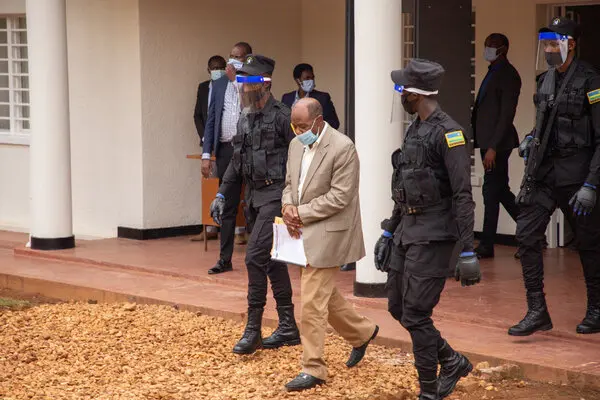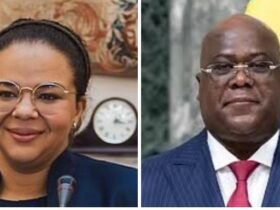When Rusesabagina was arrested, the US thought it would bully Rwanda into surrendering him manu militari. Pressure was mounted, articles written in all influential newspapers weekly, lobby firms were hired, and Hollywood stars entered into play. European lawmakers requested sanctions against Rwanda as a country and our president, Paul Kagame. Big American charities and foundations that had bestowed numerous honors on the man, all demanded his unconditional release. At some point, Anthony Blinken, America’s Secretary of State, traveled to Rwanda amid speculations that he would leave with Rusesabagina on board his US-bound aircraft. Prison rumor has it, Rusesabagina packed his bags in anticipation.
President Kagame’s response to pressure was rather final! “In order to force Rusesabagina’s release, you are going to have to invade Rwanda and release him yourselves”.
When the pressure failed, America turned to its deal broker of predilection: Qatar! Who’s Emir, Sheikh Tamim bin Hamad Al Thani happens to be President Kagame’s close friend. “Paul Kagame doesn’t yield to pressure”, the Emir advised. First, your state department must stop your double genocide conspiracies and refer to “the Genocide Against the Tutsi” in compliance with the ICTR judicial notice and the UN resolution confirming it. Second, you must stop your “hero” nonsense and recognize that Rusesabagina may have a legitimate case to answer and third, the man himself must recognize his crimes, ask for clemency and commit to never engage in crime ever again, in writing, as a prerequisite to even start talking. The US accepted the three conditions, in writing.
Paul Rusesabagina was a mega-blunder. A hallmark of poor due diligence that characterizes show business. An impostor who fit all the plot twist fantasies of Hollywood, but who didn’t take long to show his true colours, as the saying goes, fame doesn’t change people, it only reveals their true face.
On a recent trip to Washington, a senior American diplomat explained to me the Rusesabagina conundrum succinctly: “Either Rwanda has abducted and detained a hero, or the American Presidential Medal of Freedom is a charade.” This binary view was all the more alarming that half the State Department staffers I spoke to, had either volunteered at the Rusesabagina Foundation or knew a colleague who did.
The purpose of this letter is twofold:
One; to give a real account of what transpired for Rusesabagina to be released. And second, to mark in time, an unprecedented intelligence operation and subsequent geopolitical arm-wrestling that a small African country waged against the world’s superpowers.
Other than espionage its secondary meaning, the word “Intelligence” refers primarily to “the ability to use one’s brains, and to acquire and apply knowledge and skills.” A lot has been said about Rusesabagina. The facts are, that it is the first time in history, that an African country has mounted a transcontinental sting operation against a famous criminal, prized in America, owner of European citizenship, and repatriated him in compliance with international law, without the use of force.
One can have a thing to say about the drops of plutonium in Skripal’s coffee or the chopping of Khashoggi into pieces in the Saudi embassy in Turkey. Western media and secret services had for years framed the Rwandan intelligence as a rustic international hit squad. Here, it seems, Rwanda’s security services spectacularly furnished them with an undeniable taste of their “Intelligence”.
It is also the first time that a man of international fame in big superpowers no less, is arrested, arraigned in court, and sentenced. It is finally the first time that a developing country resists international pressure with no consequences and compels the US to go through a City State of two and a half million people, to negotiate on their behalf…
See, whenever America wages a war against an identified enemy, Hollywood follows up with “aftercare propaganda”, to ensure that the American version defines the aftermath in the psyche of generations to come. Growing up I used to think that the US won the war in Vietnam; I have John Rambo and Chuck Norris to thank for this. I thought Native Americans were villains, harassing God-fearing cowboys, I have Clint Eastwood to thank for that.
There is a fine line between nationalistic chauvinism aimed at cultivating a proud citizenry, and naked sophistry aimed at portraying other civilizations as barbaric and choosing heroes on their behalf. Fine, I have no power to disprove the lies about what happened in the release of Rusesabagina in the psyche of Americans, I do however, have this space, to tell the truth to anyone who will read.
A presidential pardon does not erase the crime or the sentence:
In reality, Rusesabagina is still a convicted criminal on parole. His sentence and that of his fellow convicts have been suspended temporarily – not erased, nor was the guilt. The released convicts remain culpable – and with a debt partly paid to society. Accordingly, they are to observe a set of conditions of good behavior for the remainder of their suspended sentences, failure of which may see them rearrested and their sentences reinstated.
In legal terms, there is a difference between Amnesty and Presidential pardon. An amnesty erases the crime and the sentence and makes the person innocent with retro and pro-active effects. It is as though the crime never existed and the person has always been innocent.
This is not the case for Mr. Paul Rusesabagina and his friends; the code of criminal procedure (CCP) defines the effects of each clemency measure:
Article 256: Amnesty shall extinguish criminal liability. It shall extinguish imposed penalty.
Whereas, [Art. 236(2)]: ‘Presidential pardon shall remit in whole or in part penalties imposed […] and (Art. 243): shall not entail termination of additional penalties;
Paul Rusesabagina wrote a “hearty” letter admitting his crimes, showing remorse, and committing to never take part in politics again. But no one actually believed he would be sticking to his word, after all, the word of an impostor is worthless. He was made to sign the letter to set a precedent. You see, Presidential pardon is a Damocles sword, hanging on its beneficiary’s head. A minor offense can trigger their instant rearrest to complete their awaiting jail term.
By violating the terms of his parole, Rusesa has just put himself right back in an open sky jail. Should Rwanda decide to recapture him, no one would defend him this time, so I am only worried, that the poor man and his opportunistic daughters may not really grasp the magnitude of his predicament, once again; I mean, it is not as though private jet services have closed…
We all get unwarranted lectures on the principles of Western democracy, independence of the judiciary, etc. So imagine our bewilderment when we were approached to violate the very principles we were taught, by the same people who taught them to us, because in this case, the culprit was of their making.
The difference between a political opponent and a convicted criminal:
One can be both a political opponent and a criminal; one can be either. The difference is; being a political opponent is totally legal while starting a terror organization is likely to land one in jail.
In the last legislative elections, Honorables Frank Habineza and Christine Mukabunani, self-declared political opponents with registered political parties in Rwanda clinched 5% of the legislative votes respectively, and made it to parliament for the first time. Their positions about the policies of the Rwandan Patriotic Front and its leader Paul Kagame haven’t changed much since, nor should they. Both politicians have never been convicted of any crime or sentenced to any jail term, and nor should they! Rusess on the other hand, is a convicted criminal with a pending sentence.
In the end, Rwanda accomplished its mission. No one will misuse foreign fame to play with its security, ever again. Say for instance if it was confirmed that Denis Mukwege, a known genocide denier from south Kivu, allied to Congolese local militias targeting Banyamulenge, was entertaining an armed group, he’d wake up the next day in a Kigali jail cell, and that irrespective of his Nobel Prize. In his case, not much taxpayers’ money would be spent, a wheelbarrow would suffice to convey him across the border…















When the cook’s assistant wants to compete with the General. This gives a similar result. He takes himself in the script of the film Hotel Rwanda and thinks he is a hero. I suggest that he see Sometimes in April and come down from his paste cardboard pedestal. Not only were there victims at the Mille Collines from which he clears himself, but also the terrorist attack of his armed wing. He understood that he has no lever for his disastrous plan. Sad character and badly needed because it allows us to focus on our emergencies. Cheers. J-L K
“as expected” if it was expected why did Rwandan Government released him if they was no outside pressure?
Please stop continue misleading us, he was released and his free to say what he want, releasing him and returning in US means that Rwanda has accepted the crime committed in arresting him.
Thank you for this article, but I still say it’s not enough for people to know the truth, let the government buy space in those international media houses and tell the world the entire truth and show the world that America has “got new cherished values of lies, falsehoods, deception and dishonesty”!!!
Thank you for this article, but I still say it’s not enough for people to know the truth, let the government buy space in those international media houses and tell the world the entire truth and show the world that America has “got new cherished values of lies, falsehoods, deception and dishonesty”!!!
Brilliant!!Rusesa is such a gigantic blunder…One wonders how it could happen…